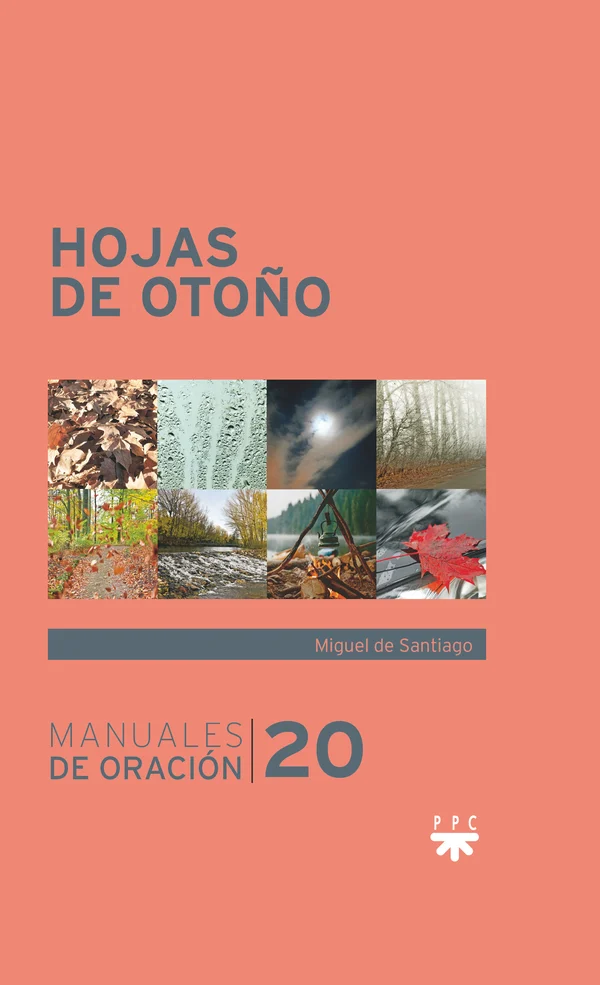Miguel de Santiago has written a book of poems in the “Prayer Manuals” collection of the PPC publishing house, which is itself a religious publishing house. This being the case, everything gives signs that it is a book on spirituality and, without ceasing to be one, it is not exactly one either. In the first place, because Miguel de Santiago is, among other merits, a recognized poet of those who used to be called “laureates”, since from his first book, Insomnia Catalog, published in 1976 in the Adonais collection, has not stopped winning prizes. He was the XVI Fernando Rielo World Prize for Mystic Poetry 1996 for VigilXV Antonio Machado Award 1997 for Reminder and Guadalajara Province Award 2001 for The path of the soul towards Love.
The second reason that breaks with the preconceived idea of Autumn leaves is that, even though it is a very spiritual book, there are few religious references among his poems. Beyond that each poem is introduced by a biblical text that seems to inspire it and with which an interesting dialogue is formed throughout the reading.
Autumn leaves
In this sense, Miguel de Santiago moves away from the lyrical tradition. Religious poetry has had great prestige in the Spanish tradition. Part of that richness came from its connection with another great poetic theme, love. Following the Petrarchan tradition, Garcilaso and Boscan wrote love poetry inspired by religion and thus praised the donna angelicata at high levels of spirit. The great mystics turned the clichés on their head and transformed that human love into a divine one, creating the best poetry ever written in Spanish. Nothing can be compared to the Spiritual Canticle, and poets and critics of the most varied fur agree there.
Autumn leaves is a contemplative book and a song to Creation. The first four poems, which form a thematic unit as an elementary tableau, set the tone for the rest of the book. The titles could not be more conclusive: “Enraptured by the earth”, “Intoxicated by the water”, “Swept away by the air” and “Amazed by the fire”. The four elements that make up nature according to ancient traditions excite the eyes of the poet. From these verses, signs of the beauty of nature are given and how it elevates the poetic soul through paths and trails, watercourses and forests, fields and sunsets. The author, born in Palencia, shows his admiration for the Castilian countryside, since he is none other than the one described in his pages. A field with a discreet beauty that has nevertheless inspired so many poets.
From a spiritual point of view, I believe that this book follows an ancient and luminous trail, since it is inspired by Saint Francis of Assisi, and I quote Pope Francis in his Praise Si’, in his prayer for the goodness of the Creator: “Praise be to you, my Lord, for our sister mother earth, who sustains us, and governs and produces various fruits with colorful flowers and grass.” Belonging to another tradition, but of equally sublime quality, it reminds me of the poetry of Emily Dickinsonwho knew how to find divinity in the small details of his garden and managed to lead a contemplative life so distant from the Puritan tradition in which he lived.
The general tone of the book is the joy of life, the joy of existing. And yet, already in the title it appears that a nostalgic background, an orientation more towards what has been lived than towards what will be lived and that derives joy from gratitude. The twilight feeling represented by the leaves falling in the penultimate season also seems to condition the poetic form. The poems mentioned are the only versified ones and from there it goes on to poetic prose, as lyrical as the previous one but without being corseted by the form. It would almost be said that the poet has opted for communication without strictures. Poetry is thus mixed with thought, aphorism and sentence.
Autumn leaves It is a very appropriate book for this time and for this period in which we live. It invites us to open our eyes, contemplate and enjoy what is around us. Something apparently simple but that we often forget.

